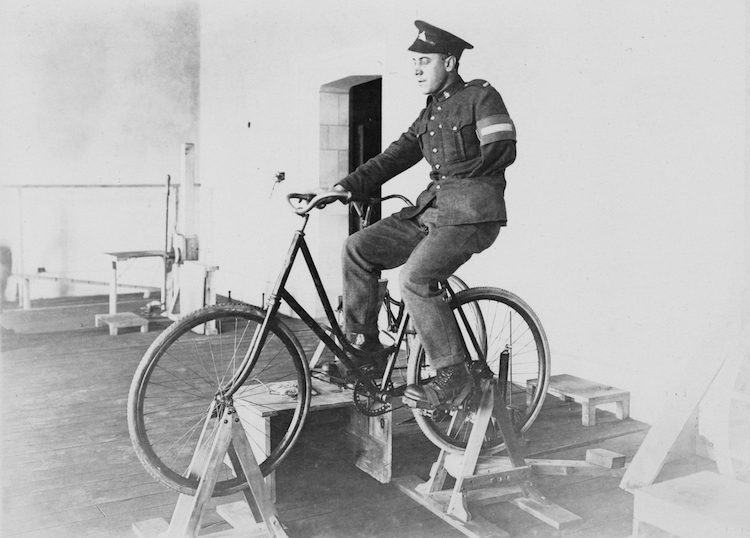In 1921 a small group of masseurs in Cape Town banded together to form the Certified Masseurs Association, primarily to rehabilitate soldiers after World War I as well as the patients affected by the polio epidemic also hitting South Africa.
In the same year the first pioneer group in the Cape was formed, a similar group in Natal formed the first South African Association, a branch of the UK Chartered Society of Massage and Remedial Gymnastics.
Realising the need for a countrywide organisation, these two groups met to hold the inaugural meeting of the South African Society of Massage and Medical Gymnastics, on 11 December 1924. The first meeting of the Central Governing Board took place in Durban in August 1925.
It is interesting to note that in 1925 the profession was felt to be ‘over-crowded’ and a request was sent to the Chartered Society in England to ask that members be discouraged from coming to South Africa.
The name of the professional body in South Africa changed three times since the first Society being ‘The South African Society of Massage and Medical Gymnastics’ to ‘The South African Society of Physiotherapists’ in 1932 and again to ‘The South African Society of Physiotherapy (SASP®)’ in 1954 as it is currently known.
Physiotherapy Education
Although the original training courses offered were three-year diploma courses based on the syllabus of the Chartered Society of Physiotherapy, the trend towards degree courses started in the late 1940s. All eight training schools now offered are four-year university B.Sc. Physiotherapy or B Physio courses, with honours status.
The Professional Board for Physiotherapy, at the Health Professionals Council of South Africa (HPCSA), lays down minimal standards for training courses for Physiotherapy in the country and perform inspections at a training school at five-year intervals.
These universities are associated with academic and affiliated teaching hospitals, and the minimal clinical practice over the four years of training is 1000 hours or more. Final examinations include clinical as well as written assignments and are required to make use of external examiners.
Although both universities and the SASP offered continuing education courses for many years, formal postgraduate education has only developed in the last two decades. Most universities are now offering honours, masters and doctoral programmes.
In both continuing physiotherapy education and postgraduate studies, the most popular clinical fields are neuromusculoskeletal therapy and neurological rehabilitation/neuro-developmental therapy, with intensive care, respiratory therapy, trauma, women’s health and sports medicine drawing increasing interest.
The first scientific journal of the SASP was published in 1929 and continued with publications three times per annum until today.
Professional Status
Advocate Alexander addressed Parliament, on behalf of the masseurs for inclusion under the first medical bill which became the Medical, Dental and Pharmacy Act of 1928 and in 1931 registration of masseurs was gazetted, although it was not made compulsory.
Compulsory registration of physiotherapy qualifications was established gradually in different magisterial districts during the 1960s. In 1971, provision was made for the establishment of separate professional boards under the umbrella of the South African Medical and Dental Council, and the Professional Board for Physiotherapy was the first of these boards to be established, in 1974. Since then, registration of recognised physiotherapy qualifications has been a prerequisite for practice.
The Scope of Physiotherapy Practice was gazette in 1974 which defined the role of the registered physiotherapist. This scope is still used in South Africa to date.
In 1985 physiotherapists were granted primary contact status when the rule requiring formal medical referral was reworded.
The Future
South Africa is embarking on universal health coverage through the National Health Insurance (NHI) which is currently in Parliament for discussion and engagement, before the Bill will be signed off by the President of South Africa.
Physiotherapy services in South Africa will undoubtfully change dramatically in the next ten years. The profession has to look at ways and means of increasing the number of physiotherapy graduates to represent the racial demographics of the country, as well as giving consideration to the training of other categories of health workers such as Community Health Workers, Peer-supporters and profession specific assistants with a two-year training resulting in a Diploma in Physiotherapy Technology. Currently there are no service provider to run with the technician training, therefore no technicians were trained officially since 2002.
It is a given that the provision of services will have to become more community based, with the accent being on promotive and preventive health care. At the same time, the needs of these communities must not be underestimated, and it is essential that the resources are available to even the most isolated communities. The responsibility for the planning and provision of services in the community must remain with the graduate physiotherapist.
References
Irwin-Carruthers S.H.1988 Physiotherapy practice in South Africa – yesterday, today and tomorrow. Physiotherapy Practice 4, 207-212:
E. Stock 1995. Physiotherapy in South Africa – past, present and future. South African Society of Physiotherapy document.


My father Clifford Sroka was a physiotherapist in Johannesburg, SA from the the late 1940’s through to the 1990’s. Is there a way for me to get more information about his career?
My grandfather Edward Alexander Rowan was a physiotherapist at King Edward VIII hospital from 1944 until about 1948 and then in private practice in Durban. Would appreciate learning if your research has any details.
Hallo Max This is very interesting and will keep an eye out for any information about him. Magda Fourie from South Africa.